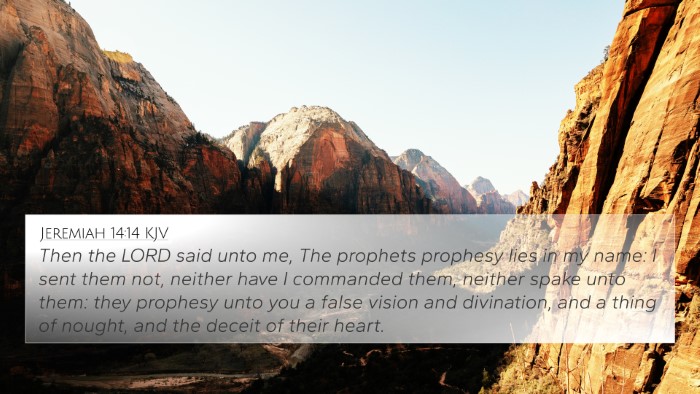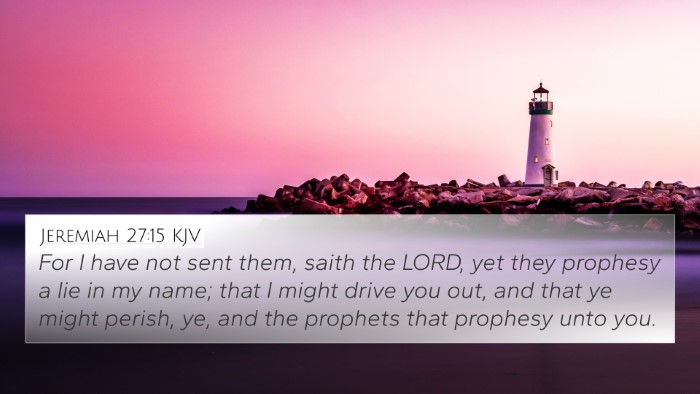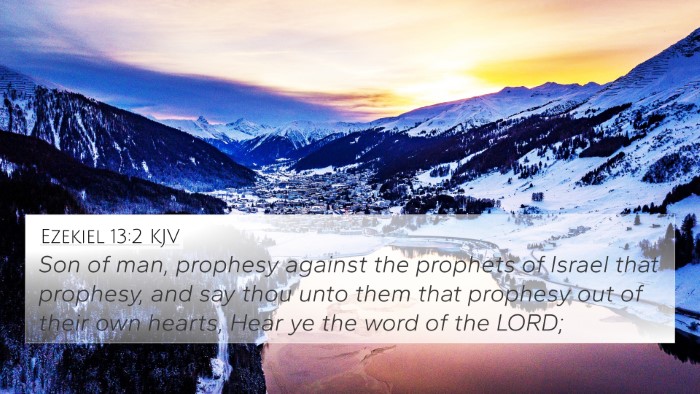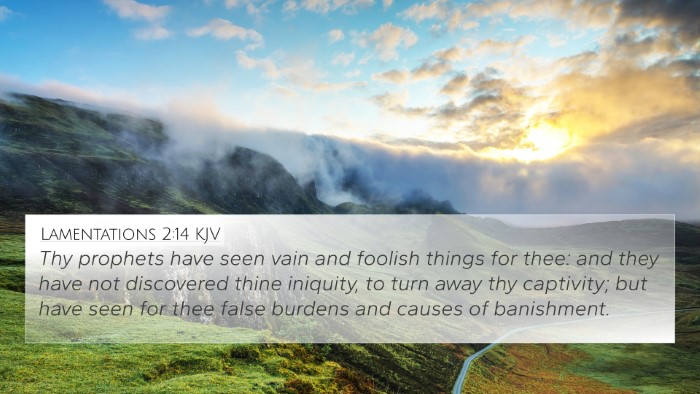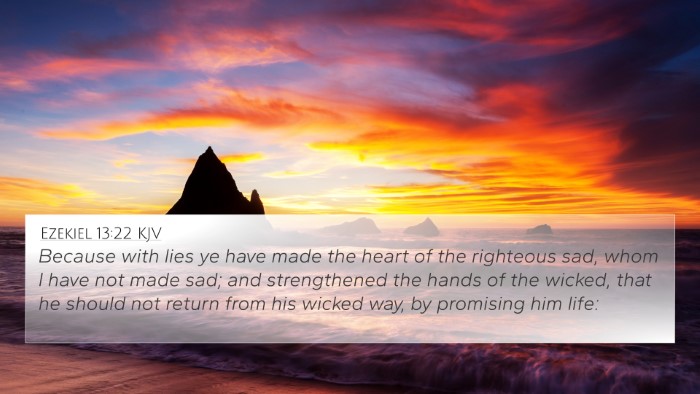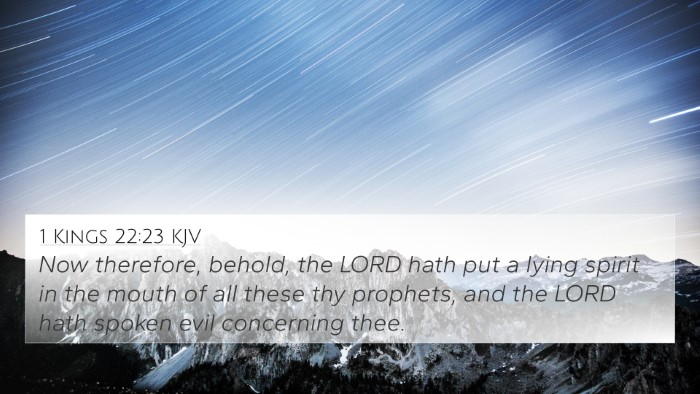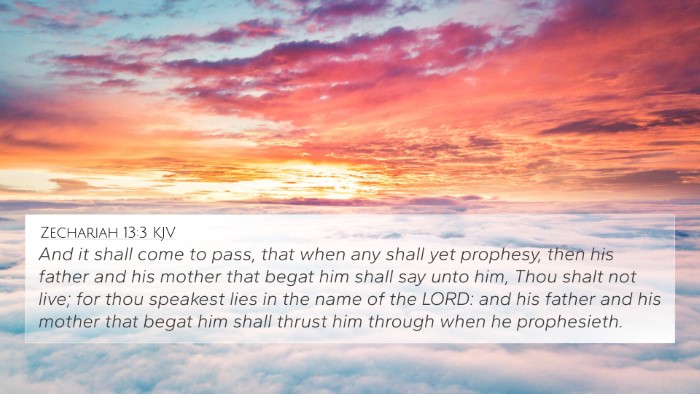Understanding Jeremiah 28:15
Jeremiah 28:15 states:
"Then the prophet Jeremiah said to Hananiah the prophet, 'Hear now, Hananiah; The LORD has not sent you, but you make this people trust in a lie.'" (Jeremiah 28:15, NKJV)
This verse is a pivotal moment within the confrontation between Jeremiah, a true prophet of the Lord, and Hananiah, a false prophet who seeks to lead the people of Israel away from God's truth.
Summary of Interpretations
The core message of Jeremiah 28:15 serves as a critical warning against false prophecies and the dangers posed by misleading spiritual leaders. Below is a synthesis of insights from public domain commentaries by Matthew Henry, Albert Barnes, and Adam Clarke:
- Matthew Henry:
Henry emphasizes the significance of discernment in prophetic messages. He notes that Hananiah's prophecy, while popular and hopeful, was rooted in deception. Jeremiah's role was to expose this lie and remind the people of the importance of listening to God's true word.
- Albert Barnes:
Barnes suggests that false prophets often arise during times of distress. He warns that their messages, though appealing, lead people astray from the painful truths necessary for genuine repentance. The contrast between Hananiah's words and Jeremiah’s prophetic truth highlights the necessity for the people to recognize and adhere to God’s revealed will.
- Adam Clarke:
Clarke reiterates the validity of Jeremiah's authority as a prophet of God. He stresses that the confidence instilled by Hananiah’s deceitful proclamation directly opposes the necessary humility and surrender required by God's people during difficult times.
Bible Verse Cross-References
To further understand the implications of Jeremiah 28:15, it is beneficial to explore Bible verse cross-references that provide thematic connections:
- Jeremiah 23:16: Warns against the prophets who deliver false visions.
- 2 Peter 2:1: Discusses false prophets and teachers arising among the people.
- Matthew 7:15: Jesus cautions believers to beware of false prophets.
- Ezekiel 13:3: Speaks of false prophets who lead God's people astray.
- 1 John 4:1: Teaches discernment regarding spirits and prophets.
- Romans 16:17-18: Advises the church to watch out for those who create divisions contrary to doctrine.
- Isaiah 9:15: Highlights the issue of false prophets who guide the people.
- Galatians 1:8: Mentions the seriousness of preaching any other gospel.
- Acts 20:29-30: Paul forewarns about wolves in sheep’s clothing among the church.
- Revelation 2:2: Commends the church for testing those who claim to be apostles but are not.
Thematic Connections
This verse opens dialogue about themes concerning:
- The truthfulness of God’s message: The necessity of adhering to God’s authentic words.
- Discernment in spiritual leadership: Understanding the difference between true and false prophets.
- The consequences of deception: The dangers that misleading teachings can impose on individuals and communities.
How To Use Bible Cross-References
Utilizing tools for Bible cross-referencing enhances the study of Bible verses that relate to each other:
- Bible Concordance: A valuable resource for finding specific verses and their connections.
- Bible Cross-Reference Guide: Offers a systematic approach to linking related scriptures.
- Cross-Reference Bible Study: Encourages methodical examination of themes and doctrinal links.
Application
For personal spiritual growth, one should critically evaluate teachings against the backdrop of Scripture to ensure alignment with God’s truth. Cross-referencing Biblical texts ensures a deeper understanding and guards against misleading doctrines.
Frequently Asked Questions
Here are some common inquiries regarding this verse:
- What verses are related to Jeremiah 28:15? The aforementioned cross-references provide a clear insight into common themes.
- How do Jeremiah 28:15 and Matthew 7:15 connect? Both verses address the need for vigilance against those who falsely represent God's word.
- Why is discernment important according to Jeremiah 28:15? It is crucial for believers to discern true spiritual guidance from falsehoods to remain aligned with God's will.
Conclusion
Ultimately, Jeremiah 28:15 not only highlights the dangers of false prophecy but also emphasizes the importance of grounding one’s faith in the truth of God’s word. By employing effective Bible cross-reference guide strategies, one can cultivate a comprehensive understanding of Scripture that protects against deception and strengthens faith.



